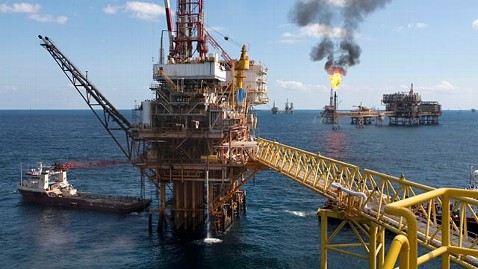Energy Debate Heats up Amid 2012 Candidates: Fact Checking GOP Claims

Susana Gonzalez/Bloomberg via Getty Images
With high gas prices weighing down on an already weak economy, energy has become a crucial issue in the 2012 campaign debate.
Republican candidates have unanimously panned President Obama, saying he has not done enough to make the United States more energy independent.
Most Republican candidates support reducing the role of the Environmental Protection Agency, cutting taxes on energy producers, expanding offshore exploration and production, and reducing government regulation of the private sector. GOP candidates argue that the president hasn’t taken the aggressive steps needed to bolster U.S. output, namely, expanding offshore oil exploration and drilling.
But not all GOP claims align with numbers.
Leading contender Mitt Romney argues that the Obama administration has smothered the domestic energy sector.
“The first three years of the Obama administration have witnessed energy and environmental policies that have stifled the domestic energy sector,” Romney’s energy plan states.
While the GOP counterparts might agree with this assessment, the numbers are on the president’s side. Domestic energy production actually increased under the Obama administration, and in the first seven months of 2011 was more than 5 percent higher than during the same time period in 2009, according to the U.S. Energy Information Administration. Exports also jumped in the same cycle by about 50 percent. At the same time, imports have dropped, especially from oil-rich Middle Eastern countries.
Romney has also lambasted the president for playing to environmental groups and lobbyists by limiting energy exploration and restricting development. But offshore oil production has grown under Obama despite the moratorium on deepwater drilling that he imposed last year, following the BP oil spill in the Gulf of Mexico. Oil production in the Gulf of Mexico was at record levels in 2010. In 2009, total oil production from the U.S. Outer Continental Shelf was the highest since 2003, according to data from the Bureau of Ocean Energy Management, Regulation and Enforcement. However, the backlog on deepwater exploration and development plans has increased and the administration has been slower to approve permits since the incident.
Herman Cain, who is leading the GOP field in several polls, has criticized the government for interfering too much in the private sector and for delaying approvals and permits for oil and gas producers. But even as he disapproves of big government, Cain has said he would create another presidential-appointed entity called the Regulatory Reduction Commission, which would “take a look at all the regulations and hoops that people have to jump through.” The group, which would be made up of industry executives, would also be designed to curb the EPA’s regulatory powers.
Romney has also assailed the president for awarding contracts and grants to companies that contribute to Democrats.
“These loans are turning out to be historic opportunities to line the pockets of major campaign fundraisers,” Romney wrote of the Obama administration’s loans to manufacturers Fisker Automotive and Tesla.
An investigation by ABC News and the Center for Public Integrity found that Tesla – a company that plans to develp an all-electric sedan – could indeed have held an upper hand. Its backed by investor Steve Westly, who is also part of Obama’s elite list of “bundlers,” people who use their connections to get more than $500,000 for the president’s campaign.
But virtually all top Republican candidates also have close fundraising ties to oil and gas companies. Romney is the top recipient of oil and gas money, followed by Tim Pawlenty – who ended his presidential campaign early in the race – and Obama. Candidates Ron Paul, Herman Cain and Newt Gingrich have all raked in thousands of dollars from the industry. In 2008, GOP presidential pick John McCain raked in more than $2.5 million from energy firms.